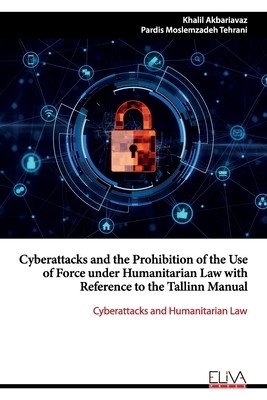
- We will send in 10–14 business days.
- Author: Pardis Moslemzadeh Tehrani
- Publisher: Eliva Press
- ISBN-10: 1952751942
- ISBN-13: 9781952751943
- Format: 15.2 x 22.9 x 0.3 cm, minkšti viršeliai
- Language: English
- SAVE -10% with code: EXTRA
Cyberattacks and the Prohibition of the Use of Force under Humanitarian Law with Reference to the Tallinn Manual (e-book) (used book) | bookbook.eu
Reviews
Description
Cyberattacks can alter the outcome of modern war through the inclusion of governmental and non-governmental actors and new technologies. The abilities of the perpetrators to cause destruction of both material and non-material assets and even injury and death to individuals through cyberspace have challenged traditional definitions of the use of force. The present study aims to investigate approaches to answering novel questions encountered by jurists attempting to deliberate on such matters. Answers to these questions should be reached within existent legal frameworks or codified within a novel legal framework. This study poses the question as to whether these attacks are covered by the prohibitions stipulated in Article 2(4) of the UN charter. It concludes that due to the novelty of the phenomenon, existing legislation inadequately regulates the use of cyberspace for hostile acts. Preliminary efforts such as codification of the Tallinn Manual by NATO have not produced the desired legal outcomes. Thus, the general principles and rules of international humanitarian law should be utilized for regulating hostile relations in cyberspace. As stated by Marten Condition a century ago, the absence of special regulations should not bar the enforcement of general regulations and the application of principles, common rules and duties. Governments require recognition of their right to defend vital infrastructure. Assuming an attacked state can identify the source of a cyberattack and attribute it to another government, response options include referring the matter to the UN Security Council or the International Court of Justice or undertaking retaliatory cyber interventions or instituting armed reactions, assuming the principle of proportionality is observed.
EXTRA 10 % discount with code: EXTRA
The promotion ends in 22d.16:31:17
The discount code is valid when purchasing from 10 €. Discounts do not stack.
- Author: Pardis Moslemzadeh Tehrani
- Publisher: Eliva Press
- ISBN-10: 1952751942
- ISBN-13: 9781952751943
- Format: 15.2 x 22.9 x 0.3 cm, minkšti viršeliai
- Language: English English
Cyberattacks can alter the outcome of modern war through the inclusion of governmental and non-governmental actors and new technologies. The abilities of the perpetrators to cause destruction of both material and non-material assets and even injury and death to individuals through cyberspace have challenged traditional definitions of the use of force. The present study aims to investigate approaches to answering novel questions encountered by jurists attempting to deliberate on such matters. Answers to these questions should be reached within existent legal frameworks or codified within a novel legal framework. This study poses the question as to whether these attacks are covered by the prohibitions stipulated in Article 2(4) of the UN charter. It concludes that due to the novelty of the phenomenon, existing legislation inadequately regulates the use of cyberspace for hostile acts. Preliminary efforts such as codification of the Tallinn Manual by NATO have not produced the desired legal outcomes. Thus, the general principles and rules of international humanitarian law should be utilized for regulating hostile relations in cyberspace. As stated by Marten Condition a century ago, the absence of special regulations should not bar the enforcement of general regulations and the application of principles, common rules and duties. Governments require recognition of their right to defend vital infrastructure. Assuming an attacked state can identify the source of a cyberattack and attribute it to another government, response options include referring the matter to the UN Security Council or the International Court of Justice or undertaking retaliatory cyber interventions or instituting armed reactions, assuming the principle of proportionality is observed.


Reviews